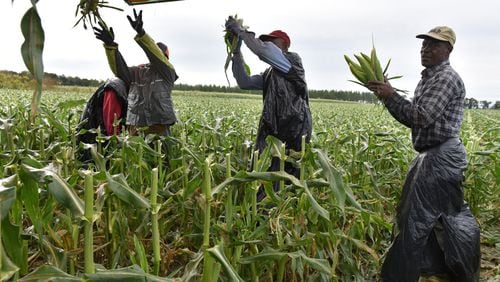South Georgia farmers may be facing a third tough year, this time because of the coronavirus, and consumers could soon also pay the price.
In late 2018, Hurricane Michael destroyed billions of dollars of their crops. In 2019, Chinese tariffs strangled trade and prices. This year, COVID-19 is wreaking havoc on the fresh vegetable market before it gets started.
In south Florida, where crops ripen sooner, farmers are plowing under thousands of acres of tomatoes, green beans and other vegetables because of the collapse of the restaurant and cruise industries and the loss of big buyers like school systems. That leaves more on the market than can be sold.
“We are just planting our stuff and getting into it. And the south Florida farmers can’t sell the produce they have already,” said Carroll Hopkins, who grows peppers, eggplant and tomatoes near Cairo in southwest Georgia.
“It concerns me a little bit,” he added. “We got a lot of money in it.”
The virus has also slowed the process of getting migrant workers into Georgia to pick crops. If solutions are not found, it could be one more shock to a Georgia economy already reeling from mass layoffs as residents stay home to stem the spread of COVID-19.
Agriculture is Georgia’s largest industry. From Waycross to way north of Atlanta, jobs in sales, logistics and factories depend on it. Kubota, the tractor and utility vehicle manufacturer, sent home 2,700 workers this week from its two plants in North Georgia because of cases of COVID-19 and to “evaluate the entire business environment.”
Greg Fonsah, an agricultural economist with the University System of Georgia, believes foreign seasonal workers will not come because of international travel restrictions and fear as the virus spreads quickly in the U.S.
Crops will be left to rot in the field and the current overproduction will dry up, he predicted. Farmers, having suffered one loss already, will be hesitant to invest again in planting full fields, so there will be a fresh vegetable shortage and increase in prices.
“The same problem will probably last the whole of this year,” he said.
Retailers and the food service industry buy about 90% of Georgia’s vegetables, said Charles Hall, executive director of the Georgia Fruit & Vegetable Growers Association. Nationally the food service industry purchases about 40%, he said. Demand in that segment has plunged as many restaurants, schools and entertainment and sports venues stay shuttered.
Georgia farmers are also facing increasing pressure from cheap imports from Mexico and Central America. “The retail market cannot handle that overload,” he said.
Adding to the problem, the virus seems to have changed buying habits, said Lisa Lochridge, spokeswoman for the Florida Fruit & Vegetable Association. Consumers are buying food with longer shelf life and those ordering online choose fewer fresh fruits and vegetables because they like to pick them out personally, she said.
It’s a double whammy for Florida farmers. They can’t sell all they have, and what they do sell brings lower prices.
“We have been putting the pedal to the metal for the last two weeks to try to come up with solutions to try to get this produce into the supply chain,” she said.
Georgia farmers have been waiting for a “get some back” year, after Hurricane Michael flattened fields and the tariff war sank prices and closed markets for everything from pigs to peanuts.
Jerod Baker, who farms about 2,800 acres in Norman Park, roughly 200 miles due south of Atlanta, has put squash and cabbage into the ground and is trying to decide whether to plant corn.
Even with some crops in the ground, there are still questions about whether enough migrant workers will be available to pick it come spring and summer. Borders have been tightened and worker visas were slowed until Agriculture Secretary Sonny Perdue and others worked to speed the process.
“I am worried about getting labor, and once we get it in, I am worried about selling,” Baker said.
Hurricane Michael, he added, “pretty much destroyed our cotton and messed up our cabbage. It’s been one thing after another.”
Cotton is fetching 48 cents a pound, “way below what it costs to grow it,” according to Baker.
“I’ve got a lot of land to plant, but I’m not sure what to put on it.”







